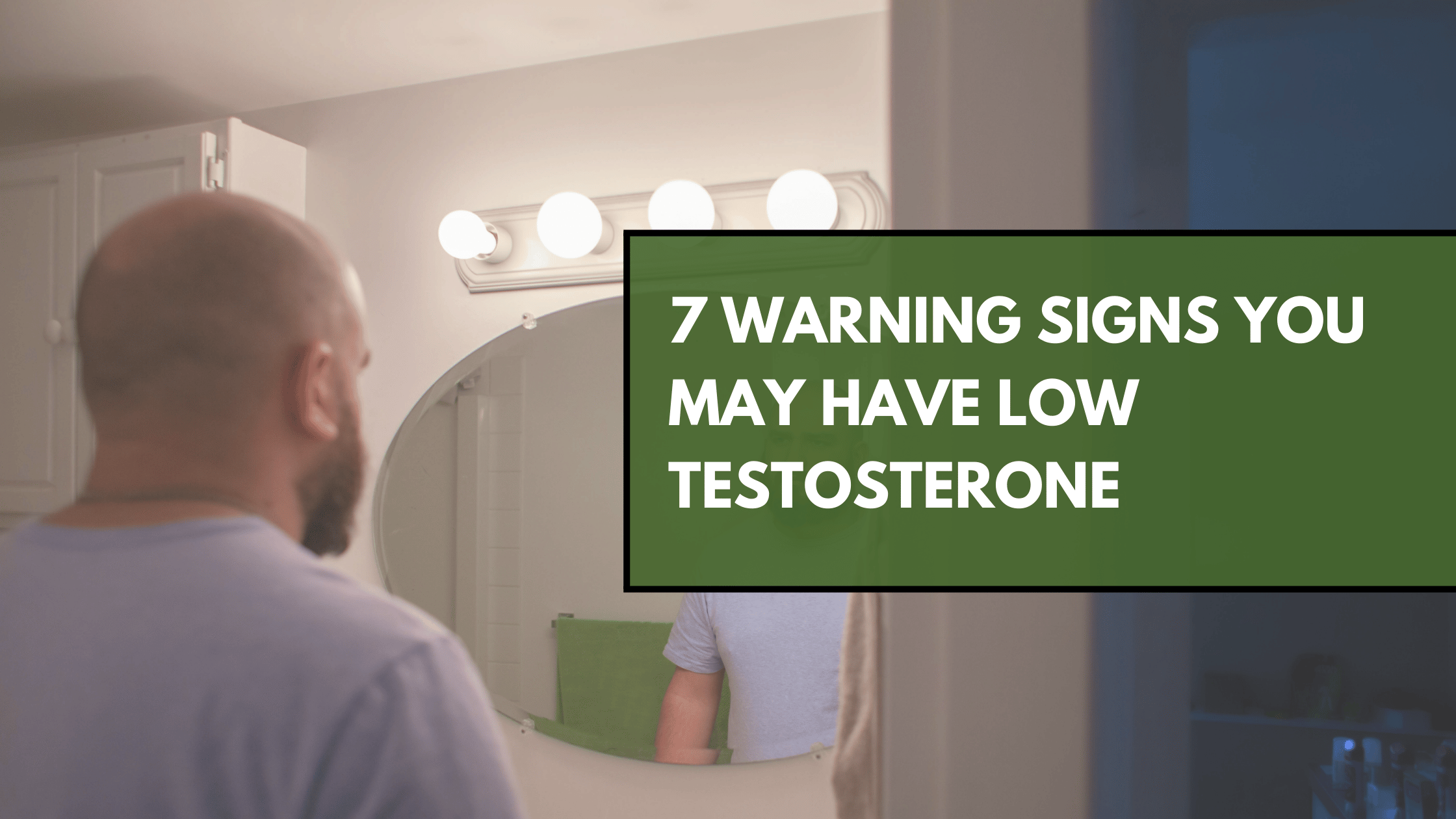
7 Warning Signs Your Testosterone May Be Running Low
Is Low Testosterone Holding You Back?
Testosterone plays a crucial role in a man’s health, impacting mood, energy levels, muscle mass, and sexual performance. But what happens when your testosterone levels begin to decline? Do you know how this may appear?
If you’ve been feeling “off” lately and can’t pinpoint the cause, your hormones may be the issue. Millions of men experience symptoms of low testosterone (often referred to as low T) without even realizing it. The good news is that it is treatable, and you don’t have to “deal with it.”
At AZ Vitality and Wellness in Peoria, Arizona, we specialize in helping men regain their vitality through personalized Testosterone Replacement Therapy (TRT) and comprehensive solutions for men’s sexual health.
Let’s take a closer look at the most common warning signs.
1. Low Sex Drive
Let’s be honest—your sex drive significantly impacts how you feel as a man. When it suddenly decreases, it can be frustrating and may affect your confidence, relationships, and overall outlook on life.
Low libido is one of the most common and earliest signs of low testosterone, yet it often goes unnoticed. Many men attribute it to stress, aging, or a busy schedule. While these factors can contribute, the reality is that hormonal imbalances may be quietly impacting your sex drive.
Testosterone is the main hormone that influences sexual desire in men. When testosterone levels decline, you may start to avoid intimacy, not because you want to, but because the desire simply isn’t there. This lack of interest can be confusing or even embarrassing, especially if you are accustomed to a fulfilling sex life.
Some men also notice that even when the opportunity for sex is there, the mental connection is missing. You might be going through the motions without truly feeling engaged. Or maybe you’re avoiding initiating altogether because you don’t feel like yourself.
If your sex drive has diminished and this has persisted for more than a few weeks, it’s important to get your testosterone levels checked. You deserve to feel connected, confident, and in control of your sexual health.
At AZ Vitality and Wellness, our team recognizes how personal and sensitive these matters can be. We’re here to provide effective solutions through Testosterone Replacement Therapy (TRT) and tailored men’s sexual health care, with no judgment and our full support.
2. Erectile Dysfunction or Performance Issues
Struggling to get or maintain an erection? You’re not alone, and it’s not something to be ashamed of. Erectile dysfunction (ED) is one of the most common and emotionally taxing symptoms of low testosterone.
While ED can be caused by a variety of physical or psychological factors, like stress, anxiety, or certain medical conditions, low testosterone is often an underlying contributor. Testosterone is the hormone that supports sexual function, stimulates receptors in the brain that trigger arousal, and helps maintain healthy blood flow and tissue in the penis.
When your levels drop, the signals between your brain and body can become misaligned. You might still want to perform, but physically, things just aren’t working the way they used to. Some men experience weaker or less frequent erections, while others struggle to stay firm long enough to complete intercourse. You may even find that morning erections are less frequent, a telltale sign of low T.
These changes can impact more than your sex life. They often take a toll on your confidence, relationships, and sense of masculinity. Many men internalize these struggles, leading to feelings of frustration, shame, or isolation.
But here’s the truth: you’re not broken, and you’re not alone. ED related to low testosterone is both common and highly treatable.
3. Fatigue and Lack of Energy
Waking up tired even after a whole night of sleep? Finding it hard to power through the day like you used to? Chronic fatigue is one of the most common and frustrating signs of low testosterone.
This kind of tiredness isn’t just about needing more coffee or a nap. It’s a profound, lingering exhaustion that makes everyday tasks feel heavier than they should. You might feel drained after a typical day at work or too wiped out to hit the gym or spend time with your family in the evening. The motivation you once had to stay active or productive just isn’t there anymore.
Testosterone plays a significant role in how your body generates and uses energy. When your levels drop, it can slow down your metabolism and impact how efficiently your cells function. The result is a lack of stamina and a constant sense of physical and mental fatigue.
You may also notice that your recovery time after physical activity is longer, or that you need more sleep than usual just to feel somewhat rested. This fatigue can also spill over into your mood and focus, creating a domino effect that makes it hard to stay on top of your responsibilities and goals.
If your energy is consistently low and you feel like you’re running on empty more days than not, it could be a sign your hormones are out of balance. It’s not just about getting older. It’s about listening to your body when it’s telling you something isn’t right.
4. Mood Swings or Irritability
If you’ve been feeling more on edge lately, quicker to snap, or emotionally off without an apparent reason, and it’s not due to the 100+ degree weather we deal with in the Arizona summertime, low testosterone might be part of the picture. Many men are surprised to learn that testosterone affects not just the body, but also mood and emotional stability.
You may find yourself feeling more easily irritated by things that previously didn’t bother you. Perhaps you’re experiencing impatience at work, being short-tempered with your family, or struggling to maintain emotional stability as you once did. For some people, this manifests as mood swings that arise unexpectedly. For others, it may appear as a constant low-level frustration or a lingering sense of emotional numbness that’s hard to overcome. a lingering sense of emotional numbness that’s hard to overcome.
Testosterone plays a crucial role in regulating brain chemicals that affect mood, such as serotonin and dopamine. When testosterone levels decrease, it can disrupt the balance of these chemicals, resulting in changes in your emotions and reactions. This imbalance may make it more difficult to cope with stress, maintain a positive outlook, and feel emotionally resilient.
Some men report feelings of increased anxiety or sadness, even when their lives appear to be going well. You may find yourself less motivated, less interested in activities you once enjoyed, or feeling less positive about yourself. These changes can start off subtle but may gradually erode your mental well-being over time.
It’s essential to pay attention to emotional shifts, just as much as you would to physical changes. Your mood plays a crucial role in your overall health, and fluctuations in emotional stability can indicate that there may be deeper hormonal issues at play.
5. Loss of Muscle Mass or Strength
If your workouts are not yielding the same results, or if you feel like you are losing strength despite staying active, low testosterone may be the cause. One of the primary functions of testosterone in the body is to support muscle growth and help maintain lean muscle mass.
You might begin to notice a gradual decline in your muscle tone, even if your weight remains relatively stable. The firm and strong feeling you once had may start to feel softer or less defined. Lifting weights could become more challenging, and your ability to build muscle may slow down or come to a standstill.
It’s not only about what happens at the gym. Everyday tasks, such as carrying groceries, climbing stairs, or playing with your kids, can start to feel more challenging than they once did. Over time, this can be discouraging and may have a negative impact on your motivation to stay active.
Testosterone plays a crucial role in protein synthesis, which is vital for muscle repair and growth. When testosterone levels decline, your body becomes less effective at maintaining and rebuilding muscle tissue. This decrease can also lead to an increase in body fat, especially around the abdomen, adding to the frustration.
This change often sneaks up gradually, making it easy to attribute to aging or a busy schedule. But if you’ve been putting in the effort and not seeing the results, it’s worth considering that hormones could be playing a bigger role than you think.
6. Brain Fog and Memory Problems
It’s normal to occasionally forget where you’ve placed your keys, but if you frequently experience mental fog or have difficulty focusing, it could be a sign of low testosterone levels. Many men are unaware of how significantly hormones affect brain function.
Brain fog can manifest as a lack of mental clarity. You might find it harder to concentrate during conversations, stay sharp at work, or remember details that once came easily. Some describe it as feeling like they’re in a haze or that their brain isn’t functioning at full capacity. This mental sluggishness can be frustrating and even a bit unsettling, especially if it begins to impact your performance or confidence.
Testosterone plays a crucial role in supporting cognitive function, particularly in areas such as memory, processing speed, and attention. When testosterone levels are low, these cognitive functions can decline. You may notice that you forget things more often, take longer to complete tasks, or struggle to stay mentally organized.
These cognitive changes often accompany fatigue and mood fluctuations, which can make it difficult to identify the root cause. You might attribute the issue to stress or lack of sleep, but if the mental fog persists despite adequate rest or caffeine, it may be time to explore what your hormones are indicating.
7. Decreased Testicle Size or Reduced Semen Volume
Changes in your body can be uncomfortable to discuss, especially when they involve something as personal as testicle size or semen volume. However, noticing these changes might indicate that your testosterone levels are lower than they should be.
Testosterone plays a crucial role in sperm production and testicular function. When testosterone levels drop, the testicles may shrink slightly in size due to reduced activity in the tissues responsible for producing sperm and testosterone. This doesn’t happen overnight; over time, you may notice a difference in how things look or feel.
Another subtle but important change can occur in semen volume. Some men report a noticeable reduction during ejaculation, even if their overall sexual function remains normal. While semen volume can vary day to day and be influenced by factors like hydration or frequency of ejaculation, consistently lower output may be linked to a hormonal imbalance.
These physical signs can sometimes go unnoticed or be dismissed as unimportant, but they are your body’s way of signaling that something may be off internally. When combined with other symptoms, such as low libido or fatigue, they help create a clearer picture of your overall health.
What to do if these signs are relatable to you
If you find yourself nodding along as you read these symptoms, you’re not alone—and you don’t have to keep wondering what’s wrong. Low testosterone is a common yet often overlooked condition that affects millions of men, especially as they age or experience high levels of stress. It can influence everything from how you feel physically to how you engage in your relationships and career.
The good news is that these changes are not permanent, and they’re not something you have to accept. With the proper guidance and care, you can start to feel like yourself again. Identifying the signs is the first step; the next step is finding answers.
At AZ Vitality and Wellness in Peoria, Arizona, we take a comprehensive and compassionate approach to men’s health and hormone optimization. Our team specializes in Testosterone Replacement Therapy (TRT) tailored to your body, lifestyle, and goals. We offer thorough lab testing, one-on-one consultations, and treatment plans designed to restore balance, boost performance, and improve your quality of life.
Whether you’re dealing with low energy, sexual performance issues, or simply feeling mentally less sharp than you used to, we are here to help you get to the root of the problem and regain control of your life.
Take the first step to feeling yourself again
Your body is telling you something. It’s time to listen and take action.
Learn more about our Men’s Sexual Health and TRT services
Schedule online with our Nurse Practitioners, Melynda or Kenra, or call 602-540-3547 to schedule your private, judgment-free consultation.
You deserve to feel strong, energized, focused, and confident. Let’s get you back to that version of yourself.





